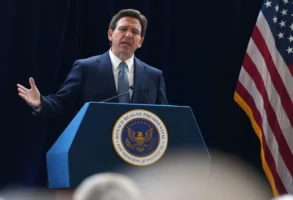
Published February 16, 2021
Advocates are attempting to smuggle training in leftist activism into K-12 schooling under the guise of “civics.” Backers of what is variously called “action civics,” “civic engagement,” and “project-based civics,” have succeeded in writing politicized “civics” requirements into state law in Illinois and Massachusetts. Now, with help from the Biden administration, this movement is poised to press “action civics” onto every state in the union. The evident goal of the action-civics lobby is to utilize schools to cement the partisan left’s hold upon our culture. The Partisanship Out of Civics Act is model state-level legislation designed to help states prevent the importation of political activism and lobbying into K-12 civic education.
Illinois leads the pack in the adoption of action civics, along with the leftist ideology that pervades this practice. Building on existing requirements that civics teachers discuss currently controversial issues and facilitate student protests and lobbying expeditions, the Illinois State Board of Education (ISBE) now proposes to force teachers to affirm the existence of both systemic oppression and the multiplicity and fluidity of gender, potentially even against religious conscience. ISBE has also recommended pressuring teachers into “mitigating” their Eurocentrism and “whiteness” by means of Critical Race Theory-based training. Additionally, ISBE has proposed redoubling pressure on teachers to organize students for “social justice” activism, and even to assess students based on such activism, rather than by way of conventional tests. The Partisanship Out of Civics Act is designed to prevent these abuses as well.
Political activism has no place in civic education. Authentic civic education is not political action itself, but rather preparation for, and prerequisite to, mature political life. Civic education conveys the purpose, nature, and structure of our constitutional republic, tells the story of the struggle to uphold its founding principles of equal rights and liberty, and cultivates virtues necessary to the republic’s preservation.
Instead of inciting students to protest or engage in lobbying based on unexamined prejudices, teachers ought to be cultivating an appreciation for the complexities, unintended consequences, and trade-offs inherent in any policy position, and conveying the importance of tempering advocacy with respect for the rights of others. Political positions are for students to determine themselves, as free individuals, in the fullness of time. Protest and lobbying are for students to practice outside of formal schooling.
The fact that “action civics” is a radical innovation gives us a clue as to why it’s so troubling. Until recently, teachers have wisely been reluctant to introduce political activism into the classroom. They’ve understood how easily a teacher’s authority can be abused in the service of indoctrination. Peer pressure also makes the classroom an inappropriate venue for political activism. Because classroom-based protest and lobbying is conducted in groups, students can easily be drafted into activism they do not genuinely understand or approve of, for fear of being shunned or left out.
The political neutrality of the classroom is itself a kind of civic education. Cultivating neutrality, and knowing when to do so, is every bit as necessary to the proper functioning of our democratic republic as is advocacy. Judges and jurors must set personal preferences aside in favor of the law. Journalists must overcome their biases to fully and fairly cover political controversies. Officials who supervise elections must do so impartially, without regard to their own partisan interests. The classroom has traditionally been a place of political neutrality for similar reasons. The fact that so many journalists and educators have abandoned the traditional aspiration to neutrality at this moment in our civic life means that teaching this principle is more urgent now than ever.
Advocates of action civics claim they are not indoctrinating, but merely helping students to put their existing political preferences into practice. That itself is troubling, since school should bring untutored prejudice into confrontation with contrary views, as in the practice of high school debate. It is a curious coincidence, moreover, that action civics classes almost invariably lead to protests on behalf of left-wing causes. The biases of a famously left-leaning teacher corps, the left-leaning advocacy groups who produce guides for action civics, as well as peer pressure, all surely play a role in the nearly uniform leftist tilt of action civics-based protests.
This case against action civics stands behind key provisions of The Partisanship Out of Civics Act (POCA). (I make the case at greater length in this piece, which I have drawn upon here.) Let us now briefly review each of POCA’s provisions.
State-based bills that seek to codify and impose action civics contain several characteristic provisions: 1) a requirement that teachers discuss currently controversial issues in class; 2) a requirement that “service learning” with “community organizations” be part of civics courses; 3) a requirement that students complete an action civics “practicum” in grade 8 and again in high school; and 4) provisions creating a dedicated fund to finance action-civics courses, including a provision allowing the use of private funding for curriculum materials and continuing professional development for civics teachers. Key provisions of POCA are designed to bar these practices from public schools (See Section B1-5).
POCA prevents teachers from being compelled to discuss “current events or widely debated controversial issues of public policy or social affairs” (Section B1). Many teachers prefer to avoid current controversies for fear of imposing their views on students or, especially nowadays, finding themselves attacked for whatever they do, or do not, say. Civics can be taught perfectly well without invoking current controversies.
Some teachers, on the other hand, may make good use of current controversies for teaching purposes. They should not be prevented from doing so. In cases where current controversies are raised in class, the model bill says teachers should “strive to explore such issues from diverse and contending perspectives” (Section B2). This is not a mandate for any particular sort of balance. The word “strive” marks the provision as aspirational. Rather than a detailed directive, this provision merely articulates an important ideal: teachers who choose to explore current controversies ought to at least attempt to avoid indoctrination and expose students to contending points of view. How precisely teachers do that is up to them.
POCA also prohibits extra-curricular “service learning” with lobbying or policy-advocacy groups from being incorporated into civics courses (Section B3). Such work is almost invariably undertaken in association with ideologically partisan groups — in practice nearly always community organizations on the left. This so-called service learning often involves students in protests or lobbying activity outside of school hours, yet it is mandated by schools. That is inappropriate. In practice, service-learning requirements for civics courses amount to schools supplying leftist advocacy groups with free labor, while effectively forcing students into vocational training for left-wing activism. After-hours politics should not be part of school, and schools should not be mandating after-hours politics.
The action civics “practicum” — required protest, political activism, and lobbying — (or any equivalent requirement) is also barred by POCA (Section B4), for reasons already discussed.
In the name of saving money, the 2015 action civics law in Illinois authorized civics curricula and teacher training to be funded from private sources. In practice, this has meant a de facto takeover of Illinois civics classes by leftist foundations, which concentrate on importing their politics to more conservative areas downstate. Allowing private donors and foundations to fund and effectively control education programs is a backdoor way of stripping voters and their elected representatives of control over schooling. POCA bars this practice (Section B5). No doubt if relatively conservative states permit private funding to support action civics, leftist foundations and donors from Hollywood and Silicon Valley will take advantage of the opening to grab control of our schools and turn the red states blue.
POCA also bars teachers from being compelled to characterize the United States as a “systemically racist” society, or to affirm the existence of multiple and fluid gender identities (Section B6). This would violate the deeply held philosophical or religious convictions of many teachers. As noted, the Illinois State Board of Education (ISBE) has proposed effectively requiring such affirmations as a condition of teacher certification. Sadly, other states may soon follow.
ISBE has also proposed standards that would have the effect of pressuring teachers into Critical Race Theory-based training to “mitigate” their “unearned privilege,” thereby enabling them to “move past their whiteness.” Adapting language from President Trump’s Executive Order banning Critical Race Theory training, POCA bars this practice (Section B7).
POCA also includes (in Section A) a mandate for a minimum basic high-school requirement in U.S. history (one year) and civics (one semester). It is true that the disastrous Common Core experiment has led schools to short-shrift history and civics. The growing movement to restore these subjects to prominence is welcome, so long as their revival is not used to import leftist indoctrination and political activism into our schools. That is what the model bill is designed to help prevent.
POCA deliberately eschews any attempt to specify curriculum content for courses in either U.S. history or civics. Curriculum content is best controlled at the local level (meaning local school districts and schools of choice). American Achievement Testing is currently working to build a curriculum in U.S. history around Wilfred McClay’s superb textbook, Land of Hope. Recommendations on civics curricula that avoid the biases and politicization favored by those who support action civics will also be forthcoming, from a variety of sources. Again, however, curriculum is best selected at the local level.
The problem with “action civics” is that is not truly “curricular” at all. Action civics represents an attempt to import political activity that is properly extra-curricular into schooling. That is wrong in principle, and that is why “action civics” (actually, political activism disguised as education) has no place in our schools.
The Partisanship Out of Civics Act is posted at the website of the National Association of Scholars (NAS), and it has been enthusiastically endorsed by NAS. NAS has been a leader and pioneer in the battle against the politicization of civic education. David Randall’s 2017 report for NAS (with contributions by Ashley Thorne), Making Citizens, was the first sustained attempt to raise the alarm on action civics, and remains the most thorough critique of this practice.
The advocates of action civics are preparing a push to spread this form of miseducation from Illinois and Massachusetts to the country as a whole. They will likely succeed in persuading the Biden administration to deploy federal carrots and sticks, on the model of Common Core, on behalf of that effort. If the states — particularly the red states — want to retain control over their own systems of education, and bar illegitimate leftist indoctrination and activism from the classroom, the Partisanship Out of Civics Act — POCA — provides a legislative model that will do the job.
Stanley Kurtz is a senior fellow at the Ethics and Public Policy Center.








